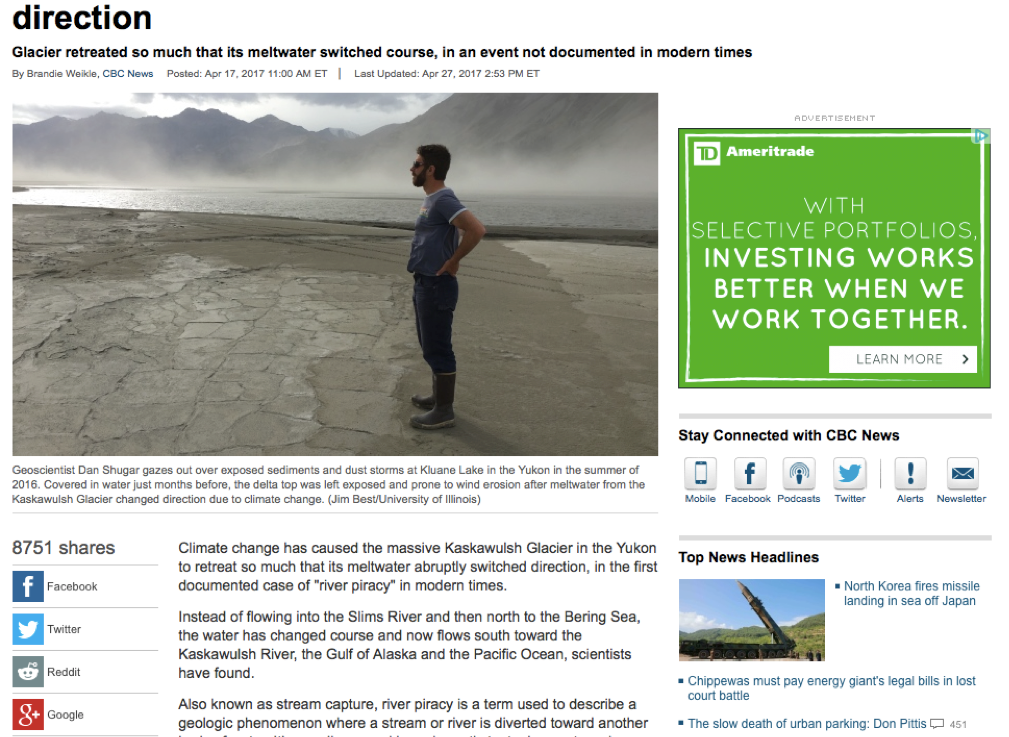I recently had a discussion with someone who remains skeptical of the magnitude of climate changes. Many people living in places such as central North Carolina aren’t experiencing any drastic changes. The weather here has always been highly variable. It’s one of those places where not incredibly rare to feel like you’ve experience all the seasons in a week’s time. There are heat waves and cold spells, periods of drought and flooding. It’s understandable that someone living here may not believe the hype about drastic problems with the changing climate.
Just today, I read an article in the news about a “pirated” river. Basically, a large river had existed in its perceived permanent path for all of human recorded history. Now that river has disappeared. Where did it go? The river was fed mainly by glacial meltwater. The glacier melted to the point that a canyon opened up that re-directed the water off the other side of the mountain. Wow! Now the people who live in towns along the river’s previous course are going to have to change their lifestyle and water use habits considerably, because they no longer have the river right at their door. This is an example of the fairly large-scale geological changes that are happening in various places around the world at a rate that has not occurred in the history of human civilization as we know it. And I bet very few people in North Carolina know about this occurrence of “river piracy”.
People in relatively undeveloped parts of the world have been noticing dramatic changes in their environments in recent years. Some of them have had the opportunity to create short documentaries about the new challenges their communities are facing with the changing climate. Their combined efforts have culminated in the Indigenous Voices on Climate Change Film Festival. The webpage for this film festival has links to some short documentaries and also to other webpages that host videos, pictures, and stories from indigenous communities around the world.
My husband and I visited the Caribbean island of Trinidad a few years ago. We drove to the sparsely populated end of the island to see the tar pits. A small, wrinkled, old man was our guide. He told us that the seasons there don’t come reliably, like they used to. The dry and rainy seasons used to be well-defined and predictable. But in recent years, the rains have been very unpredictable, making it difficult for the farmers to know when the best times are to plant and harvest their crops. It may seem odd to many people that this old man living in a very rural area on a Caribbean island brings up the topic of climate change with two random tourists on the tar lakes, but these changes in weather patterns have had significant impacts on his life. He has lived long enough to be able to recognize that weather patterns have, indeed, shifted. And his life is in tune with that of nature in a way that those of people who live in cities are not.
The vast majority of climate change skeptics in the world live in the continental U.S. where many people’s lives have not been affected by the changing climate. They have reliable HVAC systems that insulate them from the outside world. They go from their house to the car to a building, back to the car and back into the house. They don’t grow their own food– they don’t have to. It’s reliably available to them at the store down the road, in spite of any floods or droughts that farmers in the Andes or central Africa are experiencing. Most news reported in the U.S. is not about the water scarcity problems of communities in the Himalayas or the flooding issues of Polynesian islands. The news we get is what Donald Trump tweeted this week and how Saturday Night Live spoofed it. We learn that O.J. Simpson was just released from jail, and that Elon Musk has proposed a new method of transportation.
In the 1990s, the United Nations gathered together more than 2000 esteemed climate scientists from 195 different countries. The task assigned to this group of scientists was to read ALL the scientific studies from all around the world relating to climate and to write up a report to summarize ALL that research. The group was named the International Panel on Climate Change. This group of scientists has been meeting every few years since then to review all the recently published scientific studies and update their findings to reflect the inclusion of the most recent research. Their reports are made public, along with much of the information they used to put together their reports.
I encourage climate change skeptics to stop taking other peoples’ word for whether or not climate change is occurring and at what magnitude. I challenge all skeptics to instead read the reports themselves and draw their own conclusions based on all the data presented. Go to www.ipcc.ch to read about worldwide studies. Or go to climate.nasa.gov to critically analyze for yourself data collected by the U.S. governmental researchers. You can go to nca2014.globalchange.gov to read a synthesis of national research. Go to nas-sites.org/americasclimatechoices to read what the National Academy of Sciences has to say.
You wouldn’t ask your congressman to diagnose your health problems. Don’t rely on them to diagnose the environment. To get the best analysis of a situation, you go to the experts in that field. Get the information straight from the horse’s mouth and then make your own decision based on what you learn.


‘Sunny Day’ flooding is happening much closer to home. And, easier to relate to? https://www.nytimes.com/interactive/2016/09/04/science/global-warming-increases-nuisance-flooding.html
LikeLike
Wow! 10″ mean sea level rise since 1950 on the east coast— I had no idea it’d been that much already. Yeah, I guess they would be getting flooding in places that hadn’t flooded so much in the past.
LikeLike